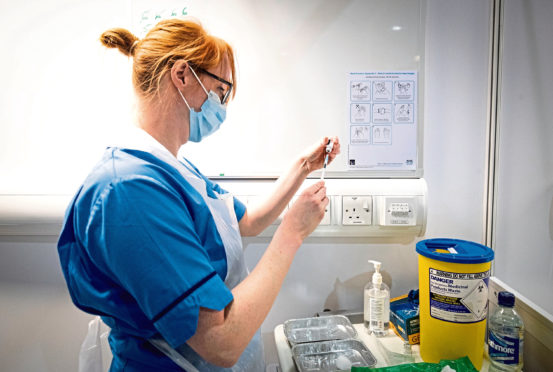
The risk of blood clots from Covid “far exceeds” any potential risks from vaccination, an expert has said.
Professor Anthony Harnden, deputy chairman of the Joint Committee on Vaccination and Immunisation (JCVI), told Good Morning Britain that around 11 million doses of the Oxford/AstraZeneca coronavirus vaccine had been administered in the UK and experts were “not seeing any increase” in signals of blood clots between those vaccinated and what would be expected in the general population.
He emphasised that the JCVI, the European Medicines Agency (EMA), the UK’s Medicines and Healthcare products Regulatory Agency (MHRA) and the World Health Organisation (WHO) had all come out to say the vaccine is “safe”.
Prof Harnden said “clearly we need to keep a very close monitoring of this situation”, but added: “It’s really important to remember that Covid is a vascular illness and causes clots all over the body”.
“So the risk of developing blood clots from Covid far, far exceeds any potential risk from the vaccination,” he added.
Professor Anthony Harnden said the Oxford/AstraZeneca Covid-19 vaccine was “safe and effective”.
The deputy chairman of the Joint Committee on Vaccination and Immunisation (JCVI), told Good Morning Britain that data on the vaccine from European nations needed to be looked at, as some countries suspended its use due to concerns about blood clots.
Asked about Norway as an example, Prof Harnden said: “We don’t know quite what the frequency is, what the subtype of the population that they’re seeing them in, or the type of clot that they’re seeing. All this information we need to find out.
“Because of course each population is different, is genetically different, is geographically different, and it may be that vaccines work differently in different populations.”
But he added: “I have no doubt that this vaccine is safe and effective, I would not give it to my patients if I thought there was any chance that there would be a major side-effect that would come out… I believe the vaccine is completely safe.
“What I don’t understand is the nuances behind the Europeans’ decisions and their data and that will become apparent in the next few days I hope and will be filtered through our regulator.”

Enjoy the convenience of having The Sunday Post delivered as a digital ePaper straight to your smartphone, tablet or computer.
Subscribe for only £5.49 a month and enjoy all the benefits of the printed paper as a digital replica.
Subscribe